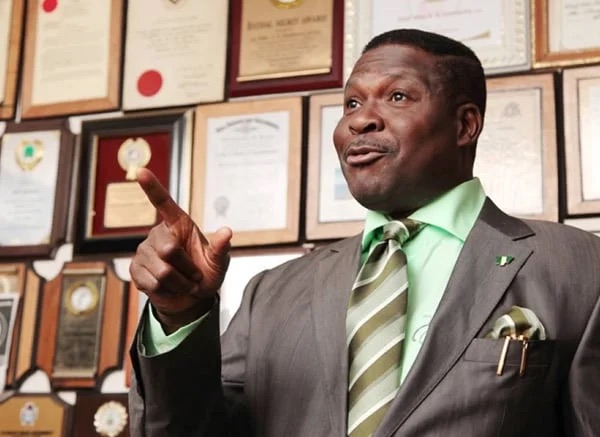• Accuse courts of giving judgments without justice, demand clearing of bad eggs
From Okey Sampson, Umuahia
A legal luminary, Mike Ozekhome, has carpeted the Nigerian judiciary for allegedly giving judgments in several election matters in the country that are bereft of justice.
Ozekhome stated this at Gregory University Uturu (GUU), Abia State, while delivering the ninth convocation lecture of the institution.
Speaking on the theme: “Judiciary as the final arbiter of electoral outcomes: Aberrations and judgements without justice,” the human rights lawyer regretted that some of the judgments passed on election matters in recent times were without justice.
Ozekhome reminded the judiciary that its role in the resolution of electoral disputes is to safeguard the integrity, fairness and legality of electoral processes by interpreting and applying electoral laws to address conflicts that emerge during or following elections.
He said this crucial function not only upholds the rule of law but also reinforces public confidence in the democratic process, providing a sense of order and justice when tensions run high.
Ozekhome pointed out that the judiciary’s role in shaping political landscapes for good or for bad is evident.
He was of the view that while some decisions upheld electoral integrity and corrected systemic failings, others raised serious concerns over proceduralism and legitimacy.
“In many cases, the emphasis on legal technicalities over substantive justice amplified public skepticism, highlighting the Judiciary’s vulnerability to criticism.
“Does the intervention reflect the will of the people, or does it substitute judicial judgment for popular sovereignty? This question strikes at the core of democratic theory and the Judiciary’s role within it.
“When the courts step in to resolve disputes, are they amplifying the people’s voice by ensuring fair representation, or are they muffling it by overriding the collective verdict obtained through the ballot?”
The SAN, who reminded the judiciary that both the electorate and those they voted for always look up to it for justice through sound judgements, said that some election petition results in the country have produced shocking outcomes that jolted the public space.
Ozekhome noted that the nullification of the June 12, 1993 presidential election, which was intended to finalize Nigeria’s transition to the Third Republic, was enabled by the controversial involvement of the Judiciary.
“The episode began when on June 10, 1993, Justice Bassey Ikpeme of the Abuja High Court in the dead of the night issued an interim injunction halting the conduct of the presidential election undertaken by then National Electoral Commission (NEC).”
Ozekhome recalled the case of Hope Uzodimma vs Emeka Ihedioha which he described as one of Nigeria’s most controversial electoral cases ever.
“It highlights the complexities of electoral jurisprudence and the challenges inherent in the Judiciary’s interpretation of Nigeria’s electoral laws.”
He said exploitation of procedural rules have added more burden on the judicial system even as he argued that quality and pertinence of testimony tendered by witness(s) is more important than the number of witnesses in an election matter as large number of witnesses may not be enough to guarantee victory for a party in election matter.
Ozekhome reminded the Nigerian judiciary of the sacrosanct roles it plays in safeguarding democracy.
He described election tribunals in Nigeria as Bat because they can not be classified as superior or inferior Courts but possesses both original and appellate jurisdictions in the adjudication of election petitions.
The legal luminary urged the judiciary to endeavour to provide sound judgements in electoral matters that would strengthen the Nigerian democracy in accordance with the independence of the judiciary.
He called for further amendment of the 1999 constitution and the 2022 Electoral Act to ensure that election petitions are concluded prior to inauguration of elected officials, as was done during the 1979 elections in the Second Republic.
“In order words, no winner of an election petition should be sworn in until the disposal of a petition challenging his or her election,” Ozekhome said.
